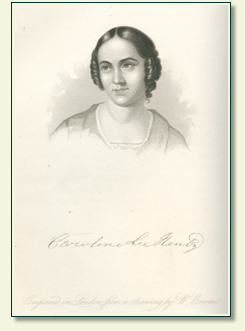
John S. Hart, ed. Female Prose Writers of America (1852), plate opposite p. 151.
CAROLINE HENTZ (1800 – 1856)
Raised in Massachusetts, Caroline Hentz composed her first poetry, drama, and novel before the age of twenty. In 1824 she married Nicholas Marcellus Hentz, an eccentric French doctor prone to paranoid jealousy throughout their marriage. He received a faculty appointment at University of North Carolina, so she followed him to Chapel Hill, where she had three children and worked on a verse-drama, De Lara, or, The Moorish Bride.
Relocating to Kentucky to help her husband run a girls' school, Caroline Hentz entered De Lara into a contest in which it won first place; performed in Boston and Philadelphia, her drama elicited positive reviews which encouraged her to write and publish two others. Continuing, at her husband's insistence, to move to a new southern town every few years, Caroline Hentz turned her concentration to novels, and, though predictable and moralizing, her books became very popular, selling successfully over the following few decades.
In North Carolina she had befriended slave George Moses Horton, edited his work, and promoted his name at the Lancaster Gazette, thus helping him become the first professional African American writer. However, her novels feature apologetic attitudes toward slavery and highlight northerners' prejudices against the South. The Planter's Northern Bride (1854), a defensive depiction of plantation life, specifically attempts to refute Harriet Beecher Stowe's indictment of slavery in Uncle Tom's Cabin.
Other portraits appear in:
Sarah J. Hale, ed. Woman’s Record (1853), p. 697; also 1855 ed.
Caroline L. Hentz. Courtship and Marriage, or, The Joys and Sorrows of American Life (1856), frontispiece.
Henry Coppée, ed. A Gallery of Distinguished English and American Female Poets (1860), p. 386.

